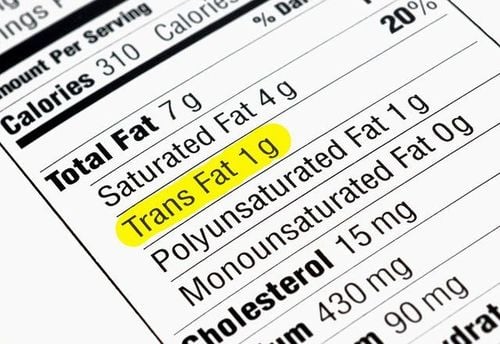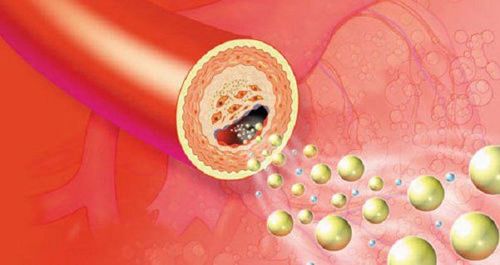This is an automatically translated article.
Trans fats belong to the group of unsaturated fats. They are easy to find inside foods: cookies, frozen pizza dough crust or in vegetable butter... However, trans fats into the body increase the risk of cardiovascular diseases. .1. Trans fats
Fats in food are made up of fatty acids. Unsaturated fatty acids have cis or trans configurations. In nature, most unsaturated fats are in the cis form, which is easily oxidized (called rancidity) during processing and storage. Therefore, the technique of hydrogenation of unsaturated fats into saturated will lose the double bonds, turning the oil from a liquid form into a solid, flexible form, hence the name shortening, solid margarine. This process also converts many cis fatty acids to the trans form. Many food products have trans fats due to the use of shortening or margarine during processing, especially fried foods such as instant noodles, snacks, or in candies, cereal bars, cookies, salad dressings, etc. Trans fat generated during the production of plant-based butter and fast food and fried food is the main cause of impact and has a strong influence on large groups of diseases: endocrine diseases (fatty liver, fatty liver, fatty liver, etc.) diabetes, obesity); cardiovascular disease, dementia; infertility and cancer.
2. Where are trans fats found?
Trans fats are naturally produced, the ideal place for them to form is in the intestines of certain herbivores. For this reason, small amounts of trans fats are also found in dairy products as well as in animal meat. Trans fats form during food processing, when hydrogen reacts with vegetable oils to change the fat from liquid to solid.
Trans fats are found in many foods containing saturated fat such as: crackers, cookies, pies, cakes or pizza, snacks, fast food, margarine, shortening...
Nutritionists The community advises: do not tolerate artificial trans fats into the body, they cause an increase in bad cholesterol and reduce good cholesterol. People who consume a lot of trans fats in their diets have a higher risk of heart attack, diabetes, and stroke.
US FDA statistics show that, when removing hydrogenated cooking oil from ready-to-eat foods, thousands of heart attacks and deaths every year can be reduced.

Chất béo có nhiều trong các đồ ăn nhanh
3. Dangers of trans fats
Trans fats are often added to foods to increase flavor and shelf life. In fact, according to research by American scientists and the World Health Organization, trans fat is the most dangerous form of fat of all harmful fats. When entering the body, like saturated fat, it increases the levels of lipoproteins and triglycerides, increases bad cholesterol and reduces the amount of good cholesterol in the blood, causing the risk of atherosclerosis.
In addition, trans fat causes blood clots, then forms a platelet-linked plaque in the form of fat, and adheres to the walls of blood vessels, gradually sealing it, making it impossible for blood to circulate, causing blood vessel blockage. , which increases the risk of stroke. A process that causes coronary arteries to become blocked, reducing blood flow to the heart, leading to angina attacks, strokes, heart attacks, and other chronic diseases like diabetes. ..
When trans fat enters the human body, it takes the place of the fatty acids the body needs. In addition, they also increase bad cholesterol, a higher risk of cardiovascular diseases. Not only that, trans fats cause inhibition of metabolic enzymes, formation of blood clots and an increased risk of stroke.
Trans fats are really harmful factors for people who often use processed foods. Trans fat has a great risk of causing great harm to human health, specifically 5 major harms with 5 groups of diseases that have a big impact:
Cardiovascular disease Trans fat increases the risk of cardiovascular disease. The reason is that trans fat entering the human body increases bad cholesterol and reduces good cholesterol.
Endocrine disease Trans fat is the main cause of obesity, diabetes, fatty liver disease.
Dementia disease Trans fat leads to the development of Alzheimer's disease, impaired memory and intelligence.
Infertility Many studies in the world have shown that: For every 2% trans fat intake into the body, there will be a 73% increase in the risk of infertility. In particular, causing infertility in women.
Cancer Cancer is a very dangerous disease. Trans fats entering the body greatly increase the risk of cancer.
4. Tolerable amount of trans fats

Lượng chất béo trans có thể dung nạp cho cơ thể
The World Health Organization WHO advises everyone that trans fat should be consumed no more than 1% of the calorie intake per daily serving, of which 1 gram of this substance should be consumed. Fat tolerance will produce 10 calories.
Although trans fats cause many harms to the body, but we can still eat within safe limits, and should not completely remove trans fat from the diet, because it easily causes imbalance of sources. natural nutrition for the body.
5. It is important to choose fats safely
Users should carefully check the fat composition of the product listed on the package before choosing to buy and use it, to ensure that the amount of trans fat tolerated by the body is safe
Types of fats Animals also known as fats often contain a lot of saturated fatty acids, which are easier to solidify, so they are used for cooking and frying. Meanwhile, vegetable fats have a lot of unsaturated fatty acids, unsaturated fats, often have a lower freezing point, should be used to eat directly such as salad dressing, mixed with porridge in the diet of the family. Children and young children
It is recommended to increase and supplement foods containing a lot of unsaturated fats to ensure a healthy body, such as: green vegetables, fruits, nuts, olives, avocados . Products containing a lot of good fatty acids that experts recommend to supplement include: skim milk products, seafood, lean meat, cereals, vegetables.
Trans fats cause a high risk of dangerous diseases: endocrine diseases, memory loss, cardiovascular disease, infertility and cancer. Although trans fat causes many dangers to the body, we should not eliminate it, but should still eat it and maintain it within a safe limit of less than 1% of total calories.
Please dial HOTLINE for more information or register for an appointment HERE. Download MyVinmec app to make appointments faster and to manage your bookings easily.













